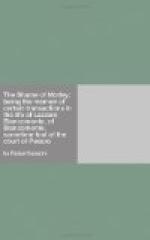Such was the very argument that I had hugged to my starving soul, at the time the things she spoke of had befallen, and it had consoled me as naught in life could have consoled me. Yet now that she employed it with such a scornful emphasis as to make me realise how far beneath her I really was, how immeasurably beyond my reach was she, it was as much consolation to me as confession without absolution may be to the perishing sinner. I answered nothing. I could not trust myself to speak. Besides, what was there that I could say?
“I summoned you back to Pesaro,” she continued pitilessly, “trusting in your fine words and deeming honest the offer of services you made me. Now that I know you, you are free to depart from Pesaro when you will.”
Despite my shame, I dared, at last, to raise my eyes. But her face was averted, and she saw nothing of the entreaty, nothing of the grief that might have told her how false were her conclusions. One thing alone there was might have explained my actions, might have revealed them in a new light; but that one thing I could not speak of.
I turned in silence, and in silence I quitted the room; for that, I thought, was, after all, the wisest answer I could make.
CHAPTER XIII
POISON
Despite Madonna Paola’s dismissal, I remained in Pesaro. Indeed, had I attempted to leave, it is probable that the Lord Filippo would have deterred me, for I was much grown in his esteem since the disclosures that had earned me the disfavour of Madonna. But I had no thought of going. I hoped against hope that anon she might melt to a kinder mood, or else that by yet aiding her, despite herself, to elude the Borgia alliance, I might earn her forgiveness for those matters in which she held that I had so gravely sinned against her.
The epithalamium, meanwhile, was forgotten utterly and I spent my days in conceiving wild plans to save her from the Lord Ignacio, only to abandon them when in more sober moments their impracticable quality was borne in upon me.
In this fashion some six weeks went by, and during the time she never once addressed me. We saw much during those days of the Governor of Cesena. Indeed his time seemed mainly spent in coming and going ’twixt Cesena and Pesaro, and it needed no keen penetration to discern the attraction that brought him. He was ever all attention to Madonna, and there were times when I feared that perhaps she had been drawn into accepting the aid that once before he had proffered. But these fears were short-lived, for, as time sped, Madonna’s aversion to the man grew plain for all to see. Yet he persisted until the very eve, almost, of her betrothal to Ignacio.




